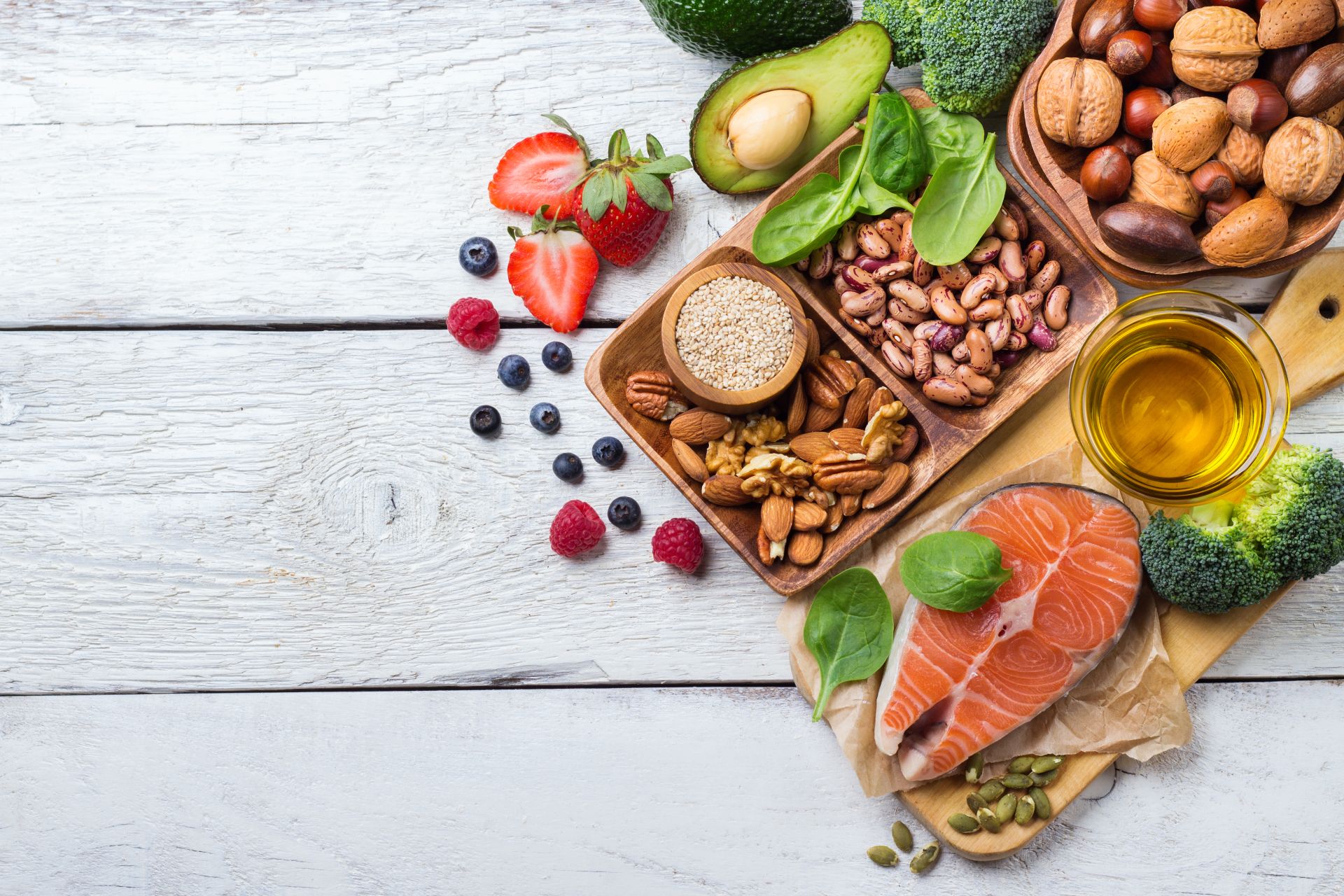Healthy eating - the most important principles

Healthy eating has more than one name. In the age of easy access to the Internet, there is a lot of conflicting information that causes confusion and confusion among many people interested in the subject of healthy eating and healthy living. A large group of people who want to lose weight and improve their health find it difficult to separate facts from myths, and therefore constantly ask themselves questions about their daily dietary choices. So let's organize our knowledge on the subject and find out what the most important principles of healthy eating are.
- Fresh fruits and vegetables are the foundation of a healthy diet
- A healthy diet should be based mainly on plant-based products
- Choose whole-grain cereal products
- Consume adequate amounts of fluids
- Eat healthy fats
- Eat fish 2-3 times a week
- Avoid caloric foods that are highly processed
- Give up frying in favor of cooking
Fresh fruits and vegetables are the foundation of a healthy diet
One of the most important principles of healthy eating is the regular inclusion in the diet of different-colored vegetables and fruits, which are a good source of vitamins, minerals, dietary fiber and a wide variety of bioactive phytochemicals that exhibit a wide spectrum of biological properties in the human body. The results of studies conducted so far clearly show that a high intake of multicolored vegetables and fruits, and especially fresh ones, contributes to a significant reduction in the risk of cardiovascular diseases (including: atherosclerosis, heart attack, stroke, hypertension), obesity, type 2 diabetes and cancer (especially colon cancer). A high intake of fruits and vegetables regulates the digestive tract and prevents constipation, as well as slows gastric emptying and has a beneficial effect on reducing postprandial blood glucose and insulin levels. It is recommended to consume at least 400 g of fruits and vegetables each day, with more vegetables than fruits in a healthy diet. According to current World Health Organization (WHO) recommendations, multicolored vegetables and fruits should be consumed at least five times a day, and preferably at every meal, regardless of the season.
A healthy diet should be based mainly on plant-based products
A key principle of a healthy diet is to consume sufficient amounts of low-processed plant-based foods each day, which are abundant in many valuable and essential nutrients for the proper functioning of the human body. Research results clearly show that adherence to a healthy diet based primarily on plant foods with high nutritional value is associated with a lower risk of obesity, insulin resistance, type 2 diabetes, lipid disorders, high blood pressure, arteriosclerosis, ischemic heart disease, stroke and cancer. It is worth noting that two popularly known dietary models with well-documented health-promoting effects on the human body, which include the DASH diet and the Mediterranean diet are based on plant-based products. Both diets are rich in a variety of vegetables and fruits (especially fresh), whole grains, legumes, nuts, almonds, seeds, pips and extra-virgin olive oil, which are widely recognized as foods with beneficial health effects.
Choose whole-grain cereal products
A rational, healthy diet includes eating several servings of whole grain products each day. In principle, all healthy people with moderately active or mainly sedentary lifestyles should primarily consume coarse grain products, such as, for example, mountain oatmeal, spelt flakes, natural sourdough rye bread, brown rice, buckwheat groats, or wholemeal pasta. Replacing in the diet light grain products with whole grain products, i.e. wheat bread with 100% rye bread on natural sourdough, light pasta with wholemeal, white rice with brown rice, couscous groats with buckwheat groats, will not only provide a greater amount of valuable nutrients (m.among others: protein, amino acids, vitamins, mineral salts, antioxidants) and dietary fiber, but also will improve the feeling of satiety after eating a meal and reduce postprandial glucose and insulin output. It is worth mentioning that a diet rich in whole grain cereal products provides plenty of dietary fiber and a variety of prebiotic substances, such as inulin, oligofructose and fructooligosaccharides (FOS), which increase the number of beneficial bacteria of the genus Lactobacillus and Bifidobacterium in the gut.

Consume adequate amounts of fluids
Another important rule for healthy eating is adequate fluid intake throughout the day. As you know, water is an essential substance for life and the proper functioning of every living organism. Proper hydration of the body contributes to maintaining good health and well-being, as well as high physical performance. The main sources of water in the diet include beverages and foods such as fresh vegetables (up to 95%), fresh fruits (up to 87%) and milk and dairy drinks (87-89%). Healthy people with moderately active lifestyles are recommended to drink at least 2 liters of fluids each day, including at least 1.5 liters of unsweetened water. Studies conducted so far have shown that consuming 1-2 glasses of water about 30 minutes before each meal can accelerate the feeling of postprandial satiety, and thus reduce the amount of calories delivered from food. It's a good idea to replace all sugary carbonated and non-carbonated beverages, the most common of which include cola drinks, energy drinks, sweetened waters, juices, nectars, fruit syrups, with non-carbonated spring or mineral water with the addition of a few slices of lemon or a few mint leaves. You should also avoid excessive use of alcoholic beverages, since 1 g of alcohol provides as much as 7 kcal, so a bottle of beer (500 ml) or a glass of whiskey (100 ml) contains about 250 kcal and can negatively affect body weight. Besides, you should learn to consume hot beverages (i.e., coffee, tea and herbs) without added sweeteners, such as sugar, honey, maple syrup, date syrup, or sweetened raspberry juice. As a last resort, you can replace them with xylitol or erythritol, which contain half as many calories per teaspoon as sugar and as much as three times less than honey.
Eat healthy fats
Healthy eating is usually associated with limiting the intake of animal fats, such as lard, butter, cream, processed cheeses and fatty meats. One of the most important principles of healthy eating is also to choose mainly plant-based sources of fat in the diet. These include: unsalted and unsweetened nuts, almonds, seeds, pips, avocados, dark cocoa, dark chocolate, hummus, tofu, tempeh, extra virgin olive oil, cold-pressed canola oil, avocado oil, good quality soft margarine, as well as peanut butter and sesame paste (tahini). They mainly contain monounsaturated and polyunsaturated fatty acids, which have a beneficial effect on the blood lipid profile and reduce the risk of developing cardiovascular disease. For example, replacing extra butter in the diet with high-quality hummus (store or homemade) can reduce the caloric content of the bread spread by as much as three times, and in the process reduce the risk of cardiovascular disease and type 2 diabetes.
Eat fish 2-3 times a week
A healthy diet should also include 2-3 servings per week of oily fish species (e.g. salmon, rainbow trout, Atlantic mackerel), which are a great source of long-chain omega-3 polyunsaturated fatty acids (especially EPA and DHA), which exhibit a broad spectrum of biological health-promoting effects. Regular consumption of oily marine fish and seafood protects against atherosclerosis of the blood vessels, and thus against heart attack and stroke.
Avoid caloric foods that are highly processed
An important principle of healthy eating is also to consciously refrain from frequent consumption of high-calorie, highly processed foods, which include.These include sweets, salty snacks, pastries, ice cream, sugary sodas, sugary breakfast cereals, sweetened dairy products, fish sticks, sausages, wieners, hamburgers, hot dogs, casseroles, nuggets, pizza, kebabs, instant soups, and powdered sauces and desserts. Highly processed foods have detrimental effects on human health due to the fact that they are high in calories, low in nutritional value and high in glycemic index and load, and contain high amounts of simple sugars, trans fats and saturated fatty acids, and low amounts of dietary fiber. In addition, processed foods contain ingredients that are probably carcinogenic to humans, which are formed during high-temperature heat processing, such as acrylamide present in chips, fries, toast, breadsticks, and crackers. What's more, highly processed foods delay the feeling of satiety as a result of disrupting the gut-brain axis communication, and have extremely high palatability, which promotes overconsumption, weight gain and potential addiction.
Give up frying in favor of cooking
Another important rule for healthy eating is to explicitly limit the consumption of fried foods. It's a good idea to start steaming dinner dishes with aromatic herbs and spices and simmering them in covered water instead of frying them in oil, lard or clarified butter. Baking without adding fat in parchment paper or an ovenproof dish is also a great idea, as is grilling on an electric grill. Putting these dinner preparation strategies into practice will significantly reduce calories and make your diet more easily digestible, thus improving your mood and abdominal comfort.
Sources:
- Nelson ME, Hamm MW, Hu FB, et al: Alignment of Healthy Dietary Patterns and Environmental Sustainability: A Systematic Review. Adv Nutr. 2016 Nov 15;7(6):1005-1025.
- Price H, Calder PC.: Defining a Healthy Diet: Evidence for The Role of Contemporary Dietary Patterns in Health and Disease. Nutrients. 2020 Jan 27;12(2):334.
- Chopra S, Malhotra A, Ranjan P, et al: Lifestyle-related advice in the management of obesity: A step-wise approach. J Educ Health Promot. 2020 Sep 28;9:239.
- Caprara G.: Mediterranean-Type Dietary Pattern and Physical Activity: The Winning Combination to Counteract the Rising Burden of Non-Communicable Diseases (NCDs). Nutrients. 2021 Jan 28;13(2):429.
- Dominguez LJ, Veronese N, Baiamonte E, et al: Healthy Aging and Dietary Patterns. Nutrients. 2022 Feb 20;14(4):889.
 ⮜ Previous article
⮜ Previous article
5 reasons to exercise
 Next article ⮞
Next article ⮞